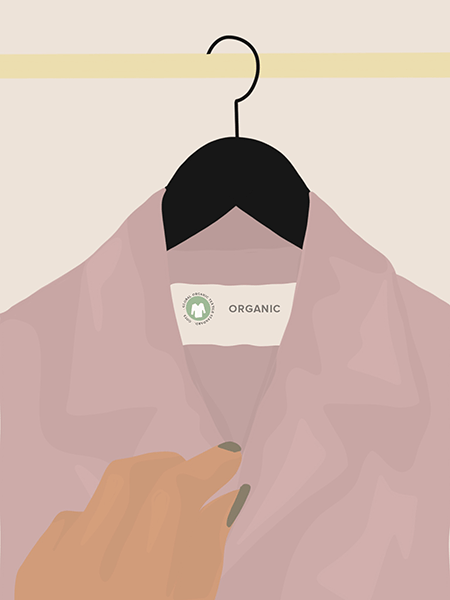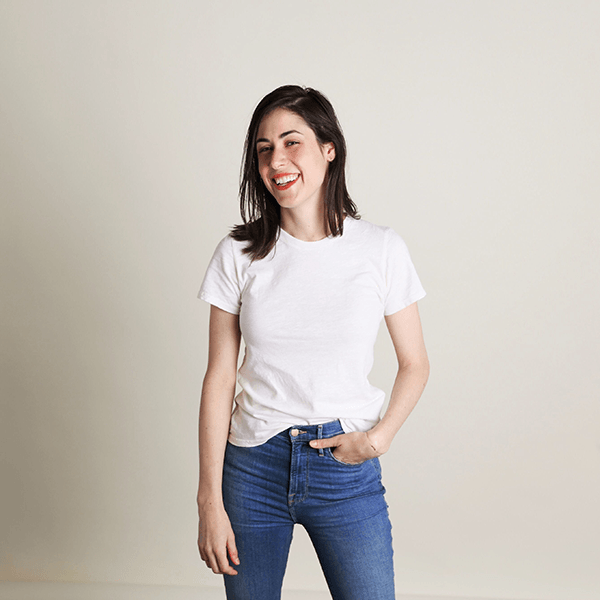You've got your tote bag under arm, Tupperware in hand, and glass jars at the ready. Now you're just scanning for products that make the world a better place. But making sure your spending habits align with your values, taking into account how the product was made and who made it, isn’t always as straightforward as it seems.
How to start shopping sustainably
Let's take a step back. At the end of the day, the most sustainable choice we can make as a consumer is to consume less. But there’s no use in swinging to the extreme and swearing off buying anything other than underwear ever again. The whole point of sustainability is that it’s, well, sustainable -- not just for the environment, but for you, too. So it’s best to find a groove that you feel comfortable and happy in, that you know you can maintain in the long-term moving forward.
Buying less and buying local are a great starting point, as well as buying second-hand, which not only intercepts the waste cycle but gives you the opportunity to find unique pieces that no one else will have. Still, sometimes we need or want to invest in something new at which point it’s time for us to make some decisions. Which brands do we give our seal of approval? How do we determine what companies we want to support? A good starting point is checking out the ethics, practices, and supply chain of each individual company. Apps like Ethical Barcode or Giki (for most goods), Think Dirty (for cosmetics) and Good On You (for fashion) makes this easier and are really useful shopping companions for rating a company's sustainability practices. But this can be time-consuming and might be tricky to evaluate without expert knowledge (what's the difference between soy grown on deforested land and soy grown on land previously used for livestock?). Plus, the more digging you do the more you realize that not all this information is readily available. In fact many companies themselves don’t even know the full details of their supply chain, which is a core part of the problem. While we continue to demand that brands be more transparent with consumers about their production processes, we can fall back on sustainability certificates to guide us along the way.
The benefits of sustainability certificates
Sustainability certificates, at a glance, can tell us a lot of what we want to know. They resolve the ambivalence we might feel when having to do company background checks ourselves and bring a far greater degree of validity and accountability to the process. Ideally, they are ultimate sustainability auditors. But what do these certificates and symbols actually mean? Unless we’re careful about knowing what lies behind them, we could end up opening the door for greenwashing or buying something which sounds great but doesn't actually align closely to our values. With a rising number of different sustainability certificates, 'label fatigue' may mean companies hide behind the fact that consumers won’t check the criteria behind a certificate. However, getting this right is a big deal for companies as well. Sustainability may be the rising tide of consumerism, but it comes with a degree of skepticism. According to a 2018 study in the Journal of Business and Technical Communication, unfounded claims of sustainable practice and greenwashing seem to have only negative effects for companies, making it more important than ever for brands to verify their practices and build trust with consumers. Here are some of the major sustainability certificates to look out for and what they mean.
What does Certified B Corp mean?
Focus: General
B Corp certification takes a holistic approach to social and environmental responsibility. They look across a businesses practices and stakeholders, from input materials to employee treatment and charitable giving, certifying cases where a business seems to be having a positive impact, not just avoiding a negative one. Their certificates are also checked every 3 years. Turning to business as part of the solution around sustainability can be criticized for avoiding the underlying systemic issues around market-driven approaches which generated the problems in the first place. But B Labs approach has changed significantly since it started in the 2000s and they reflect critically on the role that capitalist businesses can play alongside public regulation in working towards a sustainable future. Here at Consciously, we give businesses our Transparent stamp when they have increased visibility into their supply chain and disclose that information to their consumers. They know who their suppliers are, what conditions their workers are in, and how much they’re getting paid.
What does the Carbon Neutral Certification mean?
Focus: General
Carbon Trust evaluates how businesses are lowering their carbon footprint. Their Carbon Neutral Certification indicates a company's carbon emissions have been offset to net zero. It looks at efforts both to reduce carbon emissions, for example switching to renewable energy sources, and use of carbon credits. The Carbon Neutral Certification only recognizes Gold Standard carbon credits, the highest standard, but the effects of carbon offsetting in this way can be hard to verify. The criteria for its Carbon Trust Standard are lower, requiring a ‘best practice’ approach to lowering carbon emissions. However, 'best practice' is defined as reducing emissions by 0.1% every year, meaning it includes many multinational corporations.
What does Fair Trade mean?
Focus: Food and Clothing
Fair trade is one of the oldest and most established certificates around, and was a pioneering driver for taking ethical consumption to a wider audience. It checks the practices of smallholder farmers to see if they meet required standards and then ensures buyers pay smallholder farmers a fair, minimum amount so they do not get undercut in global markets if the price of the good drops. They also pay a premium to social cooperatives, so that revenue has to be reinvested into the local community, for example building schools. At Consciously, Fair Trade is one of the values we look for in brands.
What does Certified Organic mean?
Focus: Food and Textiles
Organic certificates usually signify that products have not been made using artificial fertilizers, pesticides, additives, and GMOs. Crop rotation, natural manures, and biological pest control have been used instead. Global Organic Textile Standard, one of the main certifiers for clothing, ensures organic practices are used at every stage of the clothing production cycle. And Soil Association Organic evaluates organic farming practices, certifying that a company is aiming to protect animal welfare as well as the environment. When you’re shopping on Consciously, keep an eye out for our Eco-Friendly stamp which indicates that products are made from either organic, recycled, deadstock, and/or non-toxic dyed materials. Our Vegan goods are also completely free of any animal products and byproducts, and ensure that these products do no harm to the environment either as we source either plant-based or bio-fabricated vegan items only.
What other factors contribute to sustainability?
While these are the most widely-recognized sustainability certificates, there are other parts of production that are also important and that’s why we recognize them on the Consciously marketplace.
HANDWORK
Some or all parts of these products are made or crafted by hand. They typically take longer to make, are produced by highly-skilled artisans, and are usually limited edition. This encourages slow, conscious consumerism. Browse our Handwork collection.
SMALL BATCH
These brands have small outputs in order to minimize their production waste and impact on the environment. They are able to manage their supply chain efficiently and often design and develop limited edition products. Browse our Small Batch collection.
Both of these approaches to production focus on quality and longevity over quantity, rather than churning out millions of items in a factory where workers are likely underpaid, and then switching the fashion trend a couple months later to make customers feel they need the next cool thing.
What does the future hold for sustainability certificates?
Sustainability certificates may do a lot of the work for us but they are not infallible. Evaluations of sustainability often involve complex trade offs, making it hard to determine what is truly sustainable in practice. And their auditing process can be hampered by inefficiency and inadequacy as they cannot check everything all of the time. Companies themselves don't necessarily make the task any easier. In the context of globalized outsourcing, supply chains can stretch right across the world. Keeping track of exactly where your materials come from is hard when you’re a giant international company like Apple with over 200 suppliers, but even small enterprises might find it difficult to know the exact origin of their goods. Many companies only manage by taking a truncated approach to transparency, following the production process after a certain point and leaving the true source in the shadows. The collapse of the Rana Plaza factory in Bangladesh in 2013, in which over 1,100 garment workers died, was a tragic reminder of the costs of poor working conditions, but also eye-opening for companies like Benetton which did not even know their clothes were being made there.
It showed that often, consumers don't know because companies don't even know. Technology many be able to help shed some light on this problem. Blockchain, which is used to underwrite cryptocurrencies like Bitcoin, can act like a real-time, digital ledger recording who gave what to whom in transactions. This could be game-changing and help companies keep a better record of how exactly materials exchange hands as they move through supply chains. Blockchain is not without its own issues, but organizations like Provenance are already demonstrating how it can be a force for good in supply chain transparency. Consumers may not make use of this information directly, but sustainability certification organizations can. Knowledge is power -- the more we know, the better our choices can be.




Leave a comment
All comments are moderated before being published.
This site is protected by hCaptcha and the hCaptcha Privacy Policy and Terms of Service apply.